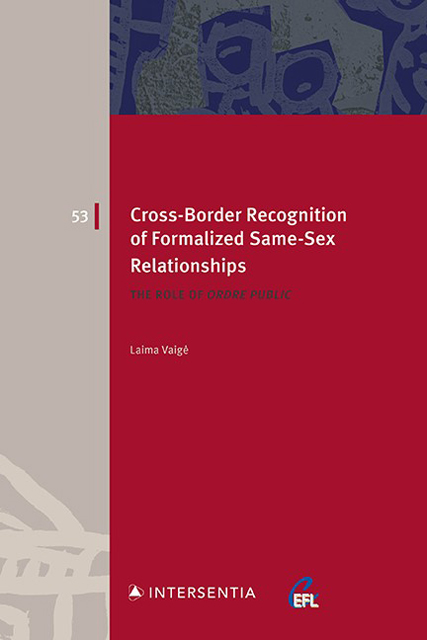Book contents
- Frontmatter
- Preface
- Contents
- List of Abbreviations
- Special Terminology
- List of Legislation and Other Instruments
- List of Cases
- Part I Setting the Stage
- Part II The Ordre Public in the Baltic States and Poland
- Part III The European and the EU Ordre Public
- Part IV Legal Effects of Formalized Same-Sex Relationships: National and Supranational Law
- Part V Law in Context
- Bibliography
- Index
- About the Author
- European Family Law Series
Chapter 3 - Cross-Border Recognition of Formalized Family Status in the Baltic States and Poland
Published online by Cambridge University Press: 20 April 2023
- Frontmatter
- Preface
- Contents
- List of Abbreviations
- Special Terminology
- List of Legislation and Other Instruments
- List of Cases
- Part I Setting the Stage
- Part II The Ordre Public in the Baltic States and Poland
- Part III The European and the EU Ordre Public
- Part IV Legal Effects of Formalized Same-Sex Relationships: National and Supranational Law
- Part V Law in Context
- Bibliography
- Index
- About the Author
- European Family Law Series
Summary
Introduction to the Chapter
This chapter is devoted to autonomous private international law in the Baltic States and Poland, relevant to the issue of cross-border recognition of formalized same-sex relationships, as well as their constitutional and substantive family law. The States are discussed in alphabetical order.
Part II of the book does not analyse the problem of entering into marriage abroad, when the nationals of the analysed States are refused “marriage impediment certificates” because their intended spouse is of the same sex. The case of Tomasz Szypuła v. Poland and Jakub Urbanik and Jose Luis Alonso Rodriguez v. Poland is pending at the ECtHR on this issue (in 2022). As explained in the Introduction to this book, the study focuses on cross-border recognition of marriages rather than on the right to enter into marriage.
A certain solution to the problem of marriage eligibility certificates has also been suggested in Polish literature. In most instances, Ewa Kamarad reported, same-sex couples could provide other civil status documents that are usually sufficient and allow them to marry abroad. From the perspective of those Member States with gender-neutral marriage laws, refusing EU citizens of their right to marry, when their own nationals can marry in that State, could potentially be considered as discrimination on the basis of nationality, which is prohibited by EU law.
Two other important cases against Poland are also pending at the ECtHR: Marta Agnieszka Handzlik-Rosuł and Anna Katarzyna Rosuł v. Poland, and Katarzyna Formela and Sylwia Formela v. Poland. In these cases, the Polish nationals complain, among other things, that their same-sex marriages have not been recognized in Poland in any form. It can still take years before the ECtHR examines these cases and it is not clear whether it will scrutinize the aspects of private international law. In their previous case-law, the European supranational courts rarely engaged in these issues, which are most relevant in this study.
The structure of the chapter is as follows. First, an explanation is given regarding the “half-baked” enactments on registered partnerships in Lithuania and, to some extent, in Estonia (section 3.2).
- Type
- Chapter
- Information
- Cross-Border Recognition of Formalized Same-Sex RelationshipsThe Role of <i>Ordre Public</i>, pp. 67 - 128Publisher: IntersentiaPrint publication year: 2022



